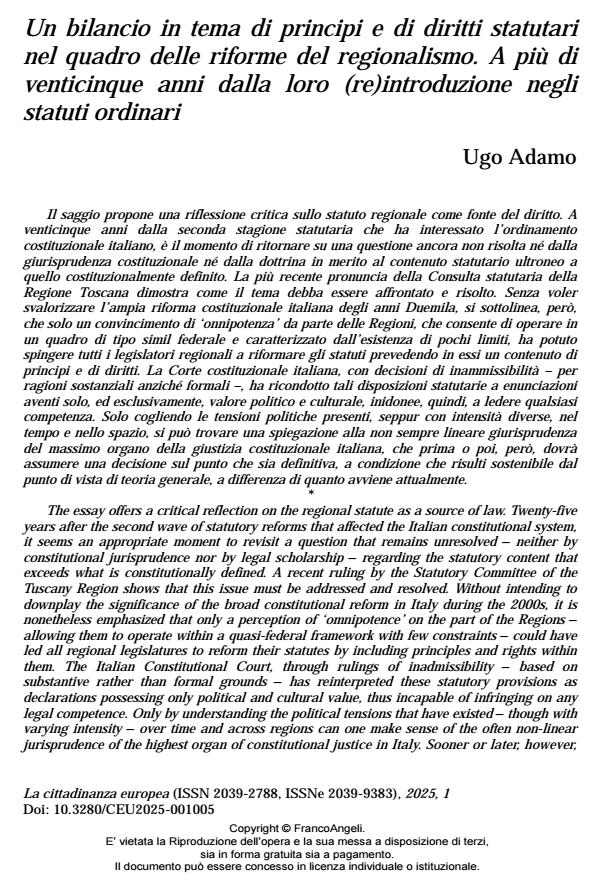Un bilancio in tema di principi e di diritti statutari nel quadro delle riforme del regionalismo. A più di venticinque anni dalla loro (re)introduzione negli statuti ordinari
Journal title CITTADINANZA EUROPEA (LA)
Author/s Ugo Adamo
Publishing Year 2025 Issue 2025/1
Language Italian Pages 102 P. 105-206 File size 653 KB
DOI 10.3280/CEU2025-001005
DOI is like a bar code for intellectual property: to have more infomation
click here
Below, you can see the article first page
If you want to buy this article in PDF format, you can do it, following the instructions to buy download credits

FrancoAngeli is member of Publishers International Linking Association, Inc (PILA), a not-for-profit association which run the CrossRef service enabling links to and from online scholarly content.
The essay offers a critical reflection on the regional statute as a source of law. Twenty-five years after the second wave of statutory reforms that affected the Italian constitutional system, it seems an appropriate moment to revisit a question that remains unresolved ‒ neither by constitutional jurisprudence nor by legal scholarship ‒ regarding the statutory content that exceeds what is constitutionally defined. A recent ruling by the Statutory Committee of the Tuscany Region shows that this issue must be addressed and resolved. Without intending to downplay the significance of the broad constitutional reform in Italy during the 2000s, it is nonetheless emphasized that only a perception of ‘omnipotence’ on the part of the Regions ‒ allowing them to operate within a quasi-federal framework with few constraints ‒ could have led all regional legislatures to reform their statutes by including principles and rights within them. The Italian Constitutional Court, through rulings of inadmissibility ‒ based on substantive rather than formal grounds ‒ has reinterpreted these statutory provisions as declarations possessing only political and cultural value, thus incapable of infringing on any legal competence. Only by understanding the political tensions that have existed ‒ though with varying intensity ‒ over time and across regions can one make sense of the often non-linear jurisprudence of the highest organ of constitutional justice in Italy. Sooner or later, however, this Court will have to take a definitive stance on the matter, and such a decision will only be viable if it is theoretically and generally sustainable ‒ unlike the current situation.
Ugo Adamo, Un bilancio in tema di principi e di diritti statutari nel quadro delle riforme del regionalismo. A più di venticinque anni dalla loro (re)introduzione negli statuti ordinari in "CITTADINANZA EUROPEA (LA)" 1/2025, pp 105-206, DOI: 10.3280/CEU2025-001005